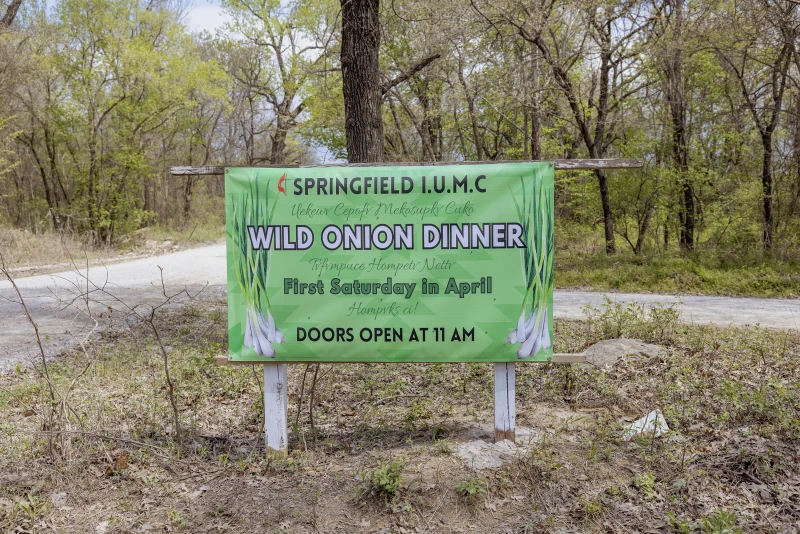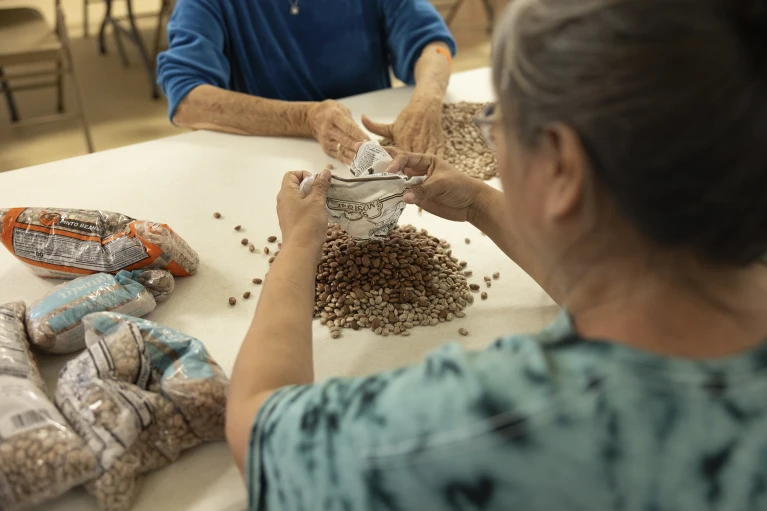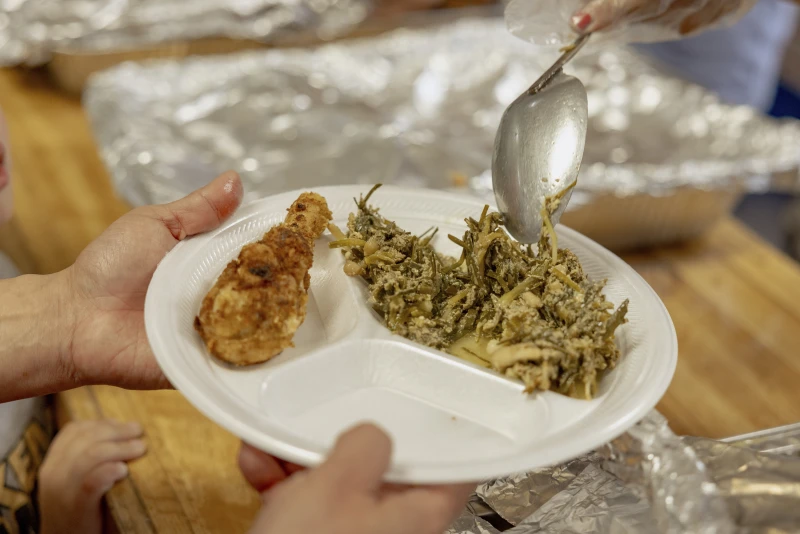The transition from winter to spring in Okmulgee, Oklahoma heralds the arrival of the vibrant purple blooms of redbud trees and the time for Cherokee chef Bradley James Dry to embark on his annual foraging expedition for morels and wild green onions.
These wild onions, a cherished staple of Native American cuisine in Oklahoma, signify the beginning of a communal tradition that has been passed down through generations of Indigenous people in the region.
From February to May, the sight of wild onion dinners every Saturday resonates with a sense of cultural significance and culinary heritage.
As Dry treads lightly through the parks and empty lots near downtown Tulsa, the fresh green stalks of the wild onions stand out against the backdrop of dried leaves underfoot.
Foraging on land that spans the Muscogee Nation and the Cherokee Nation, Dry’s thoughts drift to his elisi, his grandmother in Cherokee, who imparted the knowledge of picking and cooking wild onions to him.
With reverence for tradition and sustainability, Dry carefully harvests only what he needs, mindful of preserving the natural abundance of this seasonal gift from the earth.
The traditional method of cooking wild onions, as passed down through generations, involves boiling them in a modest amount of water and then frying them with scrambled eggs.
This simple yet flavorful dish has been a mainstay at communal gatherings, complementing a spread of fried pork, beans, frybread, chicken dumplings, cornbread, and safke—a nourishing soup crafted from cracked corn and lye derived from wood ash, prevalent among tribal nations in the southeast including the Muscogee, Chickasaw, Choctaw, Cherokee, and Seminole.
While honoring his roots, Dry also infuses a touch of modernity into his culinary creations, experimenting with wild onions in diverse dishes such as omelets, kimchi, salsa, and chimichurri for steaks.
This fusion of tradition and innovation reflects his deep respect for the past while embracing the evolving landscape of Native American cuisine.
The following Saturday morning unfolds in Okmulgee, the capital of the Muscogee Nation, where over a hundred eager individuals gather at the tribal community center for a wild onion dinner.
This annual event serves a dual purpose this year, as the community comes together to support Claudia McHenry, a tribal citizen vying to participate in the prestigious Miss Indian World Pageant in Albuquerque, New Mexico. Through this culinary celebration, the community not only honors its culinary heritage but also demonstrates solidarity and generosity towards one of its own.
As the aroma of fried onions wafts through the air and the sounds of laughter and conversation fill the community center, the spirit of tradition, community, and support intertwine in a tapestry of cultural richness and kinship.
The wild onion dinner serves as a poignant reminder of the enduring traditions and values that bind Indigenous communities together, transcending time and geography.
In conclusion, the annual wild onion dinners in Oklahoma symbolize more than just a culinary tradition—they embody a deep-rooted connection to the land, to heritage, and to community.
Through the simple act of foraging for and cooking wild onions, Indigenous people in the region continue to preserve and celebrate their cultural identity, passing down traditions from one generation to the next.

As the bright green stalks of wild onions herald the arrival of spring, they also serve as a reminder of the resilience, unity, and spirit of sharing that define Native American communities in Oklahoma and beyond.
The tradition of wild onion dinners in Oklahoma, particularly within Native American communities and United Methodist Churches, serves as a significant cultural and communal event that transcends mere fundraising activities.
This annual gathering not only fulfills practical needs by raising funds for church expenses but also fosters a sense of togetherness and solidarity among community members.
Chebon Kernell, a respected figure within his community as a mekko and a UMC clergy member, acknowledges the evolution of these dinners from simple fundraising events to large-scale community celebrations over the years.
The spirit of unity and support that permeates these gatherings is palpable, as individuals come together to cook, serve food, participate in a silent auction, and listen to the opening welcome by a local mekko.
The story of McHenry, a beneficiary of the community’s support, exemplifies the profound impact of these events on individuals’ lives.
The outpouring of support from hundreds of attendees, each paying $15 for a plate of food, not only aids McHenry on her journey but also serves as a source of inspiration and motivation for her to pursue her goals.
The allure of the wild onion dinners extends beyond the culinary delights on offer. People from neighboring states like Arkansas, Kansas, and Texas, as well as members of the Muscogee diaspora, travel long distances to partake in the festivities.
The sense of belonging and cultural connection that these events provide is evident in the stories shared by elders, the activities of children playing nearby, and the presence of vendors selling traditional beadwork and clothing.
At the heart of these gatherings is a sense of tradition and community spirit. From the head cook, Carol Tiger, overseeing the preparation of frybread mix to the communal effort of families contributing onions for the feast, every aspect of the event reflects a deep-rooted sense of shared responsibility and unity.
The atmosphere is filled with the aroma of home-cooked food, the sound of stories being told, and the sight of tribal tags adorning vehicles from across the state.
As attendees clear their plates and indulge in desserts like grape dumplings, made from traditional ingredients with a modern twist, the sense of contentment and camaraderie lingers in the air.
The conversations and connections forged during these gatherings extend well into the afternoon, creating memories that endure long after the event concludes.

Despite the passing of time and changing circumstances, the tradition of wild onion dinners persists, offering a beacon of continuity and community in an ever-evolving world.
As one event ends, another beckons on the horizon, promising further opportunities for fellowship, celebration, and the preservation of cultural heritage.
The legacy of these gatherings transcends mere fundraising efforts, embodying the resilience, unity, and spirit of togetherness that define the fabric of these communities.
